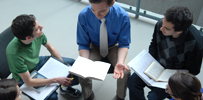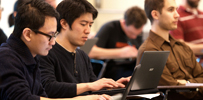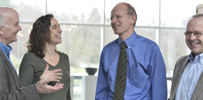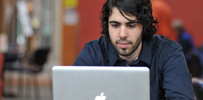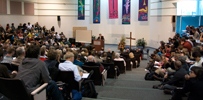Yonghua Ge on Science, Faith, and Philosophy

Dr. Yonghua Ge began his academic career in physics before transitioning to theology. He obtained an MCS from Regent in 2011, having completed a thesis on Thomas Aquinas and the doctrine of creatio ex nihilo. He went on to complete an MPhil and a PhD at Cambridge. He is currently publishing his dissertation, “The Many and the One: The Metaphysics of Participation in Connection to creatio ex nihilo in Augustine and Aquinas,” in English and Mandarin. Dr. Ge joined Regent as a post-doctoral fellow in August 2015.
You started your work in the sciences and then you transitioned into philosophy and theology. What brought that about?
That’s a huge question. I could spend hours talking about it. Well, I was not a Christian when I grew up in China. In a way, science was my religion. As a child, I was anxious about the fleeting nature of the world and life. My grandfather died when I was 13 and I was very sad. I began to ask myself: Is there anything that is permanent and unchanging?
As a result, I became fascinated with mathematical equations and scientific laws, for such things never seem to change. Even if other things change, the law of gravity is always the same. So I decided to devote my life to the study of scientific laws. I felt that by studying science I could gain a dimension of eternity; otherwise, my life was just passing by quickly.
But when I was in college, I got a bit disillusioned with science. Not that science itself was bad: the problem was that I worshipped science as a religion—as a saviour, as it were. But gradually I realized that science couldn’t be a savior. Science is, first of all, deeply impersonal. As a human being, you have emotional and existential struggles, and when you face such difficulties, science is completely silent. It doesn’t give you comfort in times of existential anxiety.
So how did you resolve that for yourself?
While I was doing a PhD in the US, I got to know some Christians. I became involved in a Bible study. What was really impressive to me was the Gospel of John, especially the opening passage: “In the beginning was the Word, and the Word was with God.” Then it says that the Word became flesh. I was shocked! It was here, I realized, that I found the answer that I had been searching for: the source of eternity and the origin of all things. I had thought that science was eternal, but I now realized that science is simply a reflection of the true eternity—the Word that created all things.
It was deeply amazing to me that the Word, the eternal Creator of all things, became flesh—became a human being. That was just mind-blowing. I had been longing for an eternity that cares for humanity, and this incarnate Word was exactly what I had been seeking. So I decided to become a Christian.
Of course, there were other struggles. I was quite arrogant and God used different experiences to humble me. I was finally humbled enough to accept Christ in 2003.
Is this when you decided to switch from studying science to theology and philosophy?
Yes, that’s how I first became interested in theology. I think I have always been philosophically minded and tend to wrestle with big questions. When I became a Christian, I had similar questions. I asked Christians around me, but nobody seemed to have very good answers.
One question was how to really live as a Christian in the world. When I first became a Christian I got the impression that once you become a Christian, you’re done with this world. But I deeply cared for “this world”—the physical world with all its beauty and the people around me, including my friends and family. And this created a huge tension in me. I couldn’t resolve it and felt torn.
So that’s why I decided to study theology. Even before I became a Christian, I knew about Regent and heard about its academic excellence. So naturally when I started thinking about pursuing theological studies, Regent was on the top of my list.
How did your background in science affect your approach to the humanities?
For some time, I thought I had wasted too much time studying science, but now I have changed my mind. I believe my scientific background is still helpful in many ways. Science uses a very structured approach, and that’s very helpful for systematic theology. In addition, theological thinking can benefit from scientific precision and concision.
But what is most helpful is that science always aims to get to the root of things. We are often faced with overwhelming data and information, and science asks what is behind all this. That is crucial for theology, for theologians also seek to move from the surface to the bottom of an issue or to the heart of a problem.
You were actively involved in the church while you were studying at Cambridge. How does that affect your academic life? Does it change your approach to theology at all?
Oh, very much. I think it’s absolutely crucial. First of all, being in a church, being part of the community, keeps you rooted in the life of church. If the primary audience of theology is God, the second and equally important audience is the church. Being part of the church helps theologians to be rooted and grounded in the body of Christ—not separated in the ivory tower.
But also, when you prepare a sermon, you are forced to engage with Scripture. When you study philosophical theology, it can be abstract and distant from Scripture. But when you teach the Bible, you have to dig into Scripture and and you can obtain insights that really inform your theologizing.
It’s also crucial that we always maintain a sense of humility when studying theology. It’s a great danger to think, “Well, I’m a theologian; I have the system.” Nobody can then really penetrate your confident inner self. But in being part of a church, you have to mingle with other Christians and continue to learn from and be challenged by them.
Your post-graduate work relates to the connection between the Christian doctrine of creation and Chinese ontology. What first led you to draw that connection, and where do you see them connecting and diverging?
My thesis was on the doctrine of creation. The reason I stretched my research into Chinese ontology was, first of all, that I was going to teach philosophy in a Chinese university. I thought, well, if I’m going to teach in China, it’s natural for me to get to know a bit of Chinese philosophy.
Secondly, I think it’s very important in the 21st century for theologians to deal with Chinese thought. As we know, China is on the rise and is going to be tremendously influential in the global arena—not only in economics, but in culture and thought. Christian theologians must learn to engage more seriously with Chinese thought.
And in terms of similarity and dissimilarity between Christian thought and Chinese philosophy—well, I only try to do one small piece of Chinese philosophy, which, as you know, is huge. The two main schools of Chinese philosophy are Confucianism and Daoism. I worked a little bit on Daoism, and from my research, I found some similarities between the Christian view of God and the Daoist understanding of the Dao. I looked at them in terms of causality and God’s relation to nature. I found that Christianity and Daoism share the idea that God or the Dao is the efficient cause—the first cause—of all things. Everything comes from and is caused by the first principle, the origin of all things. That is a common ground. There’s also a sense that all things return to God or the Dao, and I believe there’s a confluence here as well.
Maybe the most crucial difference between the Christian understanding of creation and that of Daoism is whether God is continuous with the rest of creation or not. The Christian doctrine of creatio ex nihilo is very emphatic about fundamental divide between the Creator and creatures. But that is not very clear in Daoism. There is a sort of ontological continuity between the Dao and everything else. So in that respect, I argue, Daoism is more like Neoplatonic emanation than the Christian doctrine of creation.
What’s one aspect of Chinese thought that you think the Western church would benefit from understanding and embracing more fully?
The first thing is relationality: a sense of community as opposed to individualism. In Chinese culture, and probably most East Asian cultures, the individual is always embedded in a community and can never exist alone. In the West, there’s a stronger sense of individuality—“my own space”—and the sense of community is sometimes compromised as a result. It is crucial for Christians to be part of a community: that is part of the gospel.
The second and related thing is openness to the other. In traditional Chinese culture, there is a sense of openness to a stranger. For example, once I was travelling to a tourist attraction in China. On the bus home, I was sitting next to a guy and started chatting with him. And later he became a good friend of mine and even came to my wedding! This would be impossible in most of the Western world. I have lived in the US, the UK, and Canada, and it’s my impression that there is a strong emphasis on ‘personal space’ in Western cultures. There is a sense of suspicion, a guardedness or reservedness toward strangers. But openness to the stranger—especially the wholly other—is at the heart of the Christian faith. So this is perhaps where Chinese culture can be helpful for the Western church and society as a whole.
You grew up in China, but you have lived in many places since then. Does China still feel like home? Are you still hoping to return there?
China is the place where I’ve spent most of my life. So in a sense, I consider China my homeland. But I’m not sure whether I should call it “home.” I think home is where my family is: my wife and child. I do hope to return to China someday, but I submit this to God.
Before coming to Regent, my mind was set on going back to China. But unexpectedly, the Lord brought me here. This came as a surprise and I was a bit confused. It took me a little while to make adjustments. But through this process I’ve learned that, yes, we can have dreams and passions, but ultimately the outcome is in God’s hands. I’ve learned that I need to completely surrender my plans to God. I don’t know where God is leading me next, but I’m willing to be wherever He directs me.
